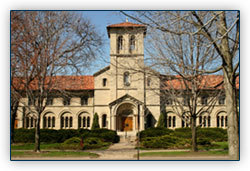Introduction
Think one person can change the world? So do we.
When a pair of Yankee missionaries founded Oberlin College in 1833, they envisioned an institution built on high intellectual standards, a liberal education for all, excellence in teaching, and a commitment to the social and moral issues of the day. For the past 171 years, Oberlin has honored this mission, encouraging students to use their liberal arts education and change the world, one Obie at a time.
Today, Oberlin CollegeÔÇÖs 440-acre campus sits next to, and has inexorably meshed with, the city of Oberlin, Ohio. A small town by definition, Oberlin (with a population of 8,600) is thirty-five miles west of Cleveland, Ohio. At first glance, the townÔÇÖs tree-lined square and old-fashioned business district may evoke memories of a sleepy Mayberry, but the annual fall migration of college students revitalizes the town with their youthful energy.
The most impressive aspect of an Oberlin College education is the genuine rapport that exists between the diverse student communities. Obies come from every corner of the globe to share an intellectually stimulating atmosphere, where they are encouraged to be socially and civically engaged through a myriad of extracurricular activities.
The small-town atmosphere is an attractive draw for many students, who (because of the townÔÇÖs proximity to the college) often forge lasting bonds with local residents. Whether itÔÇÖs over a cup of coffee at the Java Zone, participating in annual events such as the Big Parade, or during a city- and campus-wide effort to register voters, students and ÔÇ£towniesÔÇØ band together to form an experience that is uniquely Oberlin.
Oberlin is a small community. On or off campus, itÔÇÖs easy to get to know your classmates and professors, and to form lasting ties with local residents. While some people might find a small-town atmosphere confining, a visit to Oberlin and the surrounding campus would most probably change their minds. With a world-class Conservatory and some of the most forward-thinking members of their fields teaching in the College of Arts and Sciences, life at Oberlin is anything but dull. The constant stream of concerts, operas, theater productions, dance recitals, poetry readings, distinguished speakers, and other campus visitors creates a cosmopolitan climate that rivals that of a university in a big city. Not to mention all the impromptu gatherings and groups that evolve as students come and go, creating a vibrant, intellectually charged environment that is uniquely Oberlin.
An ObieÔÇÖs connection to campus doesnÔÇÖt stop after graduation. Oberlin alumni are a fiercely loyal crew, returning year after year to celebrate Commencement/Reunion Weekend and staying in touch with classmates through regional alumni groups. ItÔÇÖs an old joke that an Obie can spot a fellow Obie a mile away, but there is some truth to that statement. Oberlin graduates can be found in all walks of life and at all corners of the globe, and they are always happy to share their memories about their alma mater with prospective students, or to reminisce about sunny afternoons in Wilder Bowl.
Oberlin CollegeÔÇÖs commitment to the surrounding community has introduced countless students to the idea of service and learning. In fact, the collegeÔÇÖs addition of academically based community service courses to the curriculum encourages students to take what they have learned in the classroom and apply it to real-world service situations. Students in these classes work with local community partners to strengthen the programs that are vital to OberlinÔÇÖs diverse population.
With its emphasis on academics and social justice, itÔÇÖs no surprise that countless Oberlin grads have gone on to make a significant impact in the fights against poverty, racism, gender inequality, and other important social and political issues. Whether as doctors, lawyers, business executives, educators, politicians, or volunteers, Obies have left their mark on society by holding themselves to a higher standard and living OberlinÔÇÖs ideals long after theyÔÇÖve graduated.
OberlinÔÇÖs founding fathers would be proud.

